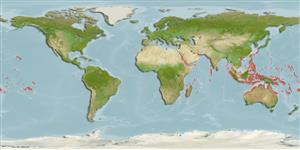分類 / Names
俗名 | 同種異名 | Catalog of Fishes(屬, 種) | ITIS | CoL | WoRMS | Cloffa
Teleostei >
Blenniiformes (Blennies)
鱸形目 (Blennies) >
Blenniidae (Combtooth blennies)
鳚科 (Combtooth blennies) > Salariinae
Etymology: Blenniella: Diminutive of blennius, Greek,blenios = mucus (Ref. 45335).
More on author: Valenciennes.
Issue
Genus Williams, pers. comm.
Environment: milieu / climate zone / depth range / distribution range
生態學
海洋 礁區魚類; 深度上下限 0 - 3 m (Ref. 30874). 熱帶; 30°N - 30°S
Indo-Pacific: Red Sea south to Durban, South Africa, east to the Marquesas and Tuamoto Islands, north to the Ryukyu Islands; throughout Micronesia.
印度-太平洋: 紅海南至南非的德爾班,東至馬可薩斯島與 Tuamoto 島, 北至琉球群島; 在密克羅尼西亞各處。
大小 / 重量 / 年齡
Maturity: Lm ? range ? - ? cm
Max length : 15.0 cm SL 雄魚/尚未辨別雌雄; (Ref. 9710)
背棘 (總數) : 12 - 14; 背的軟條 (總數) : 18 - 21; 臀棘: 2; 臀鰭軟條: 19 - 21; 脊椎骨: 25 - 27. Diagnosis: Dorsal fin XIII, 18-21, notched between spinous and segmented-ray portions; anal fin II, 19-21; pectoral rays 13-15 (usually 14); pelvic fin I, 3; caudal fin, procurrent rays 7, segmented rays 13. Vertebrae 12 + 25-27. Orbital cirrus simple and slender, may have a short lateral branch, less often up to 4 branches; nasal cirri short and palmate, may rarely have more than 6 branches; nuchal cirri simple and slender, may have a single branch or a ragged edge. Mandibular pores 6. Dorsal lips margin entire, ventral margin crenulated. Occipital crest absent, but large males have a low thin ridge (less than 1.8 mm); no crest or ridge in females Three color-pattern types described for different localities (see Ref. 9962). Body of males with 6-7 dusky bands with 1 or a pair of dark margined, pale, oblong spots on each band; dark spots on spinous dorsal, dusky lines on rayed dorsal. Females with spots on caudal peduncle; body sometimes with fine dark specks (Ref. 4404). Body depth at anal-fin origin 4.6-5.3 in SL (Ref. 90102).
三彩色斑紋類型為不同的地點描述。 (見參考文獻 9962) 雄性的身體有 6-7 暗色的條紋有一個或一對深色的邊緣是, 在每條條紋上的灰白又長方形斑點; 在有鰭條的背鰭上的在刺狀的背部又暗色的線上的深色的斑點。 雌魚有斑點在尾梗上; 身體有時有深色細的斑點。 (參考文獻 4404)
Adults inhabit exposed outer intertidal reef flats, where it can hide in cracks and holes. Commonly observed clinging to rocks as the water recedes below them during the low cycle of the swell and this species is often confused with mudskipper gobies (Ref. 48636). They feed on filamentous algae and associated small invertebrates, such as foraminiferans, ostracods, copepods, and gastropods. Oviparous. Eggs are demersal and adhesive (Ref. 205), and are attached to the substrate via a filamentous, adhesive pad or pedestal (Ref. 94114). Larvae are planktonic, often found in shallow, coastal waters (Ref. 94114). Rarely used for aquarium fish.
棲息於裸露的潮間帶外圍礁石平臺, 在那裡它能藏在裂縫與洞中。 通常觀察附著於岩石當海水消退低於他們海浪週期低點期間與這種時常與彈塗魚互相混淆.(參考文獻 48636) 吃絲狀藻類與伴隨的小型無脊椎動物例如有孔蟲,介形蟲,橈腳類的動物與腹足動物。 卵生的.(參考文獻 205) 很少用來了水族館魚。
Life cycle and mating behavior
成熟度 | 繁殖 | 產卵場 | 卵 | 孕卵數 | 仔魚
Distinct pairing (Ref. 205).印度-太平洋: 紅海南至南非的德爾班,東至馬可薩斯島與 Tuamoto 島, 北至琉球群島; 在密克羅尼西亞各處。
Springer, V.G. and J.T. Williams, 1994. The Indo-West Pacific blenniid fish genus Istiblennius reappraised: a revision of Istiblennius, Blenniella, and Paralticus, new genus. Smithson. Contrib. Zool. 565:1-193. (Ref. 9962)
IUCN 瀕危狀態 (Ref. 130435: Version 2024-1)
無危 (LC) ; Date assessed: 24 March 2009
人類使用
漁業: 沒有興趣
工具
特別的報告
下載 XML
網路資源
Estimates based on models
Preferred temperature (Ref.
123201): 25 - 29.3, mean 28.4 °C (based on 2554 cells).
Phylogenetic diversity index (Ref.
82804): PD
50 = 0.5020 [Uniqueness, from 0.5 = low to 2.0 = high].
Bayesian length-weight: a=0.00389 (0.00180 - 0.00842), b=3.12 (2.94 - 3.30), in cm total length, based on all LWR estimates for this body shape (Ref.
93245).
營養階層 (Ref.
69278): 3.3 ±0.43 se; based on food items.
回復力 (Ref.
120179): 中等的, 族群倍增時間最少 1.4 - 4.4年 (Preliminary K or Fecundity.).
Fishing Vulnerability (Ref.
59153): Low vulnerability (10 of 100).
Nutrients (Ref.
124155): Calcium = 115 [56, 183] mg/100g; Iron = 0.664 [0.377, 1.120] mg/100g; Protein = 18.5 [17.3, 19.6] %; Omega3 = 0.0767 [, ] g/100g; Selenium = 16.1 [7.5, 34.7] μg/100g; VitaminA = 144 [44, 446] μg/100g; Zinc = 1.83 [1.21, 2.64] mg/100g (wet weight);
